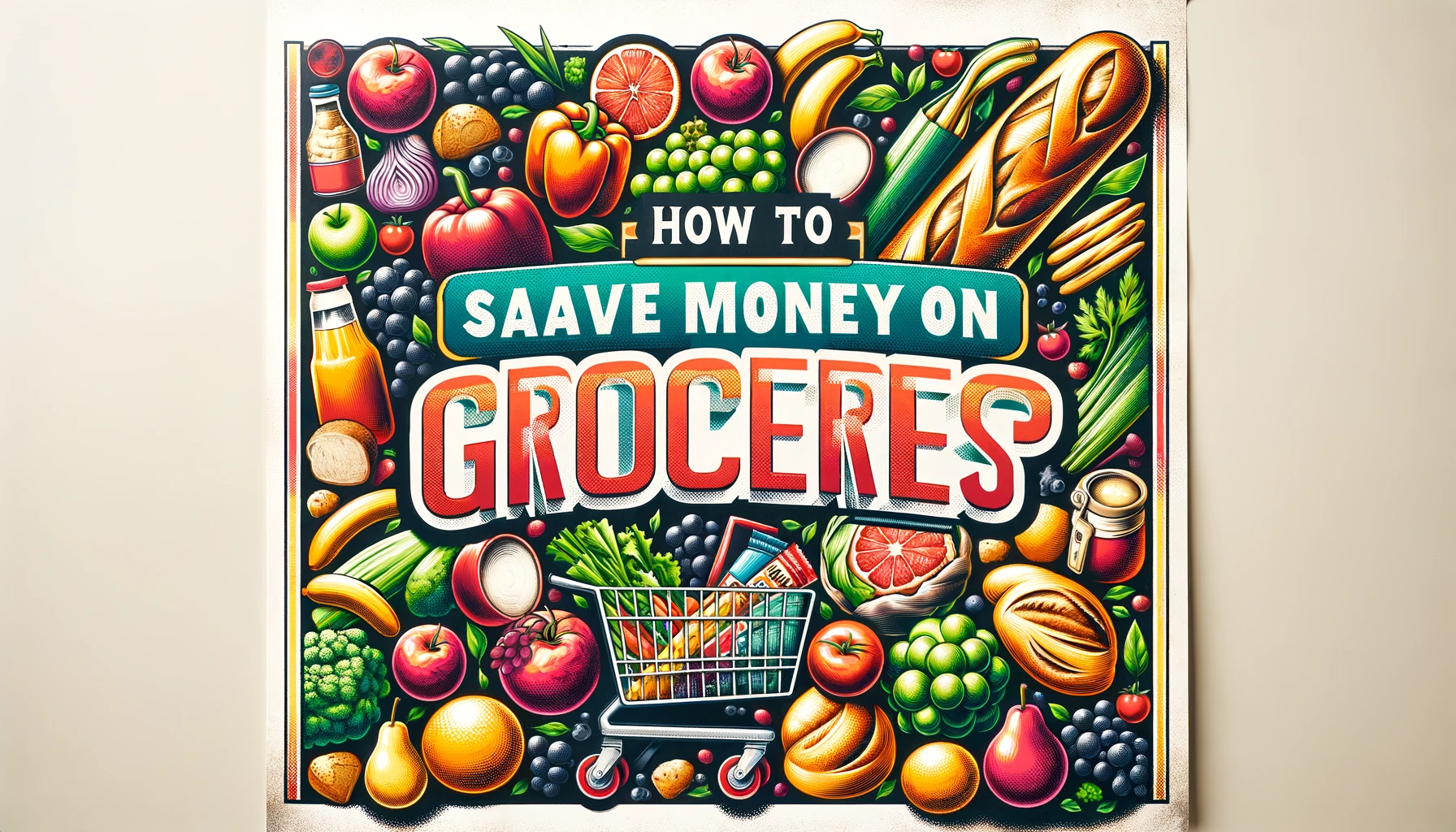In the quest for budget-friendly shopping, saving money on groceries tops the list for many households. Effective strategies can significantly reduce your monthly food expenses without compromising on quality.
Here, we’ll explore numerous tactics—from planning ahead to smart shopping habits—that can help you save money each time you shop.
Plan Before You Shop
Create a Weekly Meal Plan
Crafting a weekly meal plan involves selecting specific dishes to prepare over the course of the upcoming week. This strategy not only streamlines the shopping process by enabling you to purchase only the essential ingredients, but it also minimizes food waste and prevents excessive spending on superfluous items.
By planning your meals in advance, you can ensure a more organized, efficient, and cost-effective approach to managing your household’s dietary needs.
Make a Shopping List and Stick to It
To effectively manage your grocery expenses, it’s essential to devise a comprehensive shopping list that aligns with your pre-planned meals. This strategy helps in curbing unnecessary purchases, thereby keeping your spending in check.
By strictly adhering to this list when shopping, you can avoid the temptation of spontaneous buys that often lead to overspending. This method not only streamlines your shopping process but also ensures that your purchases are thoughtful and economically efficient.
Check the Pantry
Before making a trip to the grocery store, take a moment to inspect your pantry and refrigerator thoroughly. This simple habit can prevent the unnecessary acquisition of duplicate items and encourages the utilization of products that may soon expire.
This approach not only saves money but also minimizes food waste, helping you to manage your kitchen more effectively and sustainably.
Understand Sales and Promotions
Learn Store Sale Cycles
Gaining insight into the typical sales patterns of grocery stores can significantly enhance your shopping strategy. Many supermarkets tend to follow a consistent cycle when it comes to discounts and promotions.
By familiarizing yourself with these patterns, you can determine the optimal periods to purchase various products, ensuring you get them at their most affordable prices. This approach not only helps in budget management but also in making the most out of your shopping trips.
Use Coupons Wisely
To optimize savings, it’s smart to strategically use coupons when shopping. Collect coupons from both traditional sources like newspapers and modern online platforms. Focus on securing coupons for products you truly require to avoid unnecessary purchases.
Additionally, for enhanced cost reduction, try to synchronize your coupon use with store sales, allowing you to capitalize on the maximum possible discounts. This method ensures you only spend on essentials while benefiting from significant savings.
Sign Up for Loyalty Programs
Enrolling in loyalty programs at various retail outlets can be highly beneficial as these programs often grant members access to unique discounts, special coupons, and exclusive promotional events. By signing up, consumers can take advantage of these perks, which are tailored to reward frequent shoppers and enhance their shopping experience.
Shop Smart
Compare Prices
When shopping, it’s beneficial to use unit pricing to effectively evaluate the cost differences between various brands and package sizes. This strategy can help you discern whether buying in bulk provides the most economical option, though it’s important to note that this is not universally true.
Analyzing the price per unit allows for a more accurate assessment of value, enabling smarter purchasing decisions that can lead to significant savings over time.
Choose Generic Brands
Opting for store brands instead of well-known national brands can be an effective way to save money without sacrificing quality. Many consumers find that these generic products offer a comparable level of quality at a much lower price point.
This budget-friendly choice is beneficial for those looking to manage their spending more efficiently while still purchasing reliable and effective products.
Avoid Convenience Foods
Choosing whole foods over pre-packaged options such as pre-cut or pre-washed items can lead to significant savings and often promotes a healthier diet. While ready-to-eat products offer convenience, they typically come with a higher price tag.
By selecting unprocessed ingredients, you can manage your budget more effectively and benefit from fresher, less processed food choices. This approach encourages a more natural eating habit, steering clear of the extra costs and often unnecessary additives found in convenience foods.
Be Strategic About Where and When You Shop
Shop at Discount Stores
When looking to stretch your budget, visiting discount supermarkets can be a wise choice.
These establishments provide a similar range of products found in conventional grocery stores, yet they offer significant savings by pricing items more affordably. By choosing to shop here, consumers can manage their grocery expenses more effectively while still enjoying access to their preferred brands and essentials.
Shop Late in the Day
Opting to do your grocery shopping later in the day, particularly as stores are preparing to close, can be a strategic move for budget-conscious consumers. During these hours, supermarkets often mark down prices on items like bakery goods, meats, and various perishables that they need to sell before the day ends.
This practice not only helps the stores clear out stock that might otherwise go to waste, but it also allows shoppers to snatch up deals, making it a win-win for both parties involved.
Explore Local Farmers’ Markets
Visiting local farmers’ markets is a smart way to access fresh produce while often benefiting from lower prices. Particularly towards the closing hours of the market, you may find vendors are more inclined to offer discounts on their products.
This strategy helps them avoid the hassle of transporting unsold items back home, enabling shoppers to snag great deals on quality goods.
Use Technology to Your Advantage
Mobile Apps
The proliferation of mobile applications today offers numerous tools designed to assist consumers in maximizing their savings while shopping. These apps are adept at scouring the internet for the best deals, providing users with the lowest prices available, offering digital coupons, and even facilitating cashback rewards for purchases made.
This technological advancement empowers shoppers to make informed decisions by ensuring they get the most value out of every transaction.
Online Grocery Shopping
When considering purchasing groceries online, it’s beneficial to compare prices across various digital platforms. Online retailers often provide attractive pricing options that can lead to significant savings when you consider the time and expense associated with a trip to a physical store.
By taking a few moments to review different offers on the internet, shoppers can make more informed decisions and potentially reduce their overall shopping costs.
Manage Food Wisely at Home
Store Food Properly
To maximize the longevity of your groceries and reduce waste, it’s essential to master the art of proper food storage. Understanding the optimal conditions for various types of food items can significantly prolong their freshness.
This involves recognizing the appropriate temperatures, humidity levels, and storage methods that best suit each category of food, from perishables like fruits and vegetables to pantry staples such as grains and spices. By adopting these practices, you can ensure your groceries remain fresh and edible for as long as possible, ultimately saving money and minimizing food waste.
Practice Portion Control
Employing effective portion control techniques when cooking can significantly minimize waste and promote financial savings. By preparing meals in precise amounts tailored to your needs, you not only ensure that food is consumed more responsibly but also conserve resources.
Additionally, dividing snacks and bulk purchases into smaller, pre-measured servings can aid in maintaining a balanced diet and managing consumption, further enhancing the economical and health benefits of this practice.
Get Creative with Leftovers
Embrace the art of transforming leftovers into innovative dishes. This approach not only helps in cutting down on grocery expenses but also adds a delightful twist to your meal planning routine. By reimagining previously cooked meals into fresh culinary creations, you engage in a sustainable practice that enhances both your palette and your budget.
Check Similiar Article: How Much Money Should you Save Each Month?
Conclusion:
To effectively reduce your grocery expenses, it’s essential to integrate careful planning, informed decision-making, and tactical purchasing strategies into your routine. This approach isn’t merely about reducing overall costs but also about optimizing the value of every dollar spent.
By committing to this method, you not only adhere to your budget but also ensure that your purchases contribute positively to your nutritional needs and financial objectives. This requires a proactive stance—preparing meal plans, staying informed about prices and promotions, and shopping judiciously. Through these steps, you’re able to prepare wholesome meals that align with both your health standards and fiscal boundaries, thereby maximizing the efficacy of your grocery spending.
Frequently asked Questions
I always overspend at the grocery store. What can I do?
Planning is key! Make a meal plan for the week and create a grocery list based on your meals. This helps avoid impulse purchases and ensures you only buy what you need.
Are store brand products really cheaper than name brands?
Often, yes. Store brand or generic products are typically much cheaper than name brands and offer similar quality. Do a taste test at home to see if you notice a difference.
Should I shop at multiple stores?
It depends. If you have several stores with good deals nearby, strategically picking up items on sale at each store can save money. However, consider the gas and time spent compared to the savings.
Is buying in bulk a good way to save?
Bulk purchases can be cost-effective, but only if you have the storage space and will use everything before it expires. Don’t get stuck with items you won’t use!
When is the best time to shop for groceries?
Wednesday is a popular day for grocery stores to put out new sales flyers. Weekends can also offer good deals to entice customers.
How can I resist temptation at the grocery store?
Shop with a full stomach to avoid impulse purchases based on hunger. Stick to your list and avoid browsing the aisles where strategically placed, often more expensive, items are located.
What are some smart ways to save on fruits and vegetables?
Buy seasonal produce – it’s usually fresher and cheaper. Frozen fruits and vegetables can be a good option too, as they’re flash-frozen at peak ripeness and retain nutrients. Consider buying “ugly” produce that’s perfectly good but cosmetically imperfect, often at a discount.
Are there apps that can help me save money on groceries?
Yes! Many grocery store apps offer digital coupons and show weekly sales flyers. Other apps help you compare prices across stores or plan meals based on ingredients on sale.
Should I pay with cash or a credit card at the grocery store?
Cash can help you stick to your budget better as you see the money leaving your wallet. However, some credit cards offer rewards programs for grocery purchases, which can be a good choice if you pay your balance in full each month.
How can I reduce food waste and save money?
Plan meals to use up leftovers. Learn proper food storage techniques to extend the shelf life of your groceries. Create a shopping list based on what you already have in your pantry and fridge to avoid buying duplicates.


